Currency Drop Prompts Calls For Removal Of Iran Central Bank Chief
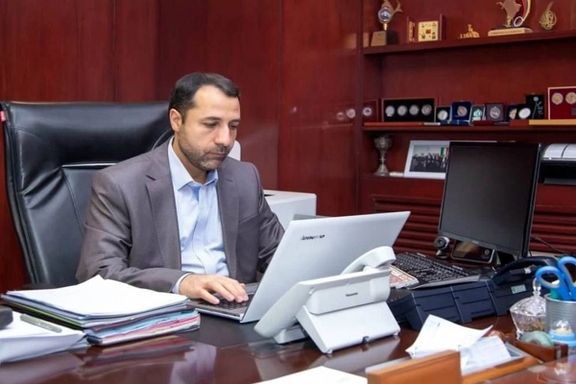
Calls are mounting to remove the chief of Central Bank of Iran (CBI) after the national currency hit another historic low against the US dollar on Tuesday.

Calls are mounting to remove the chief of Central Bank of Iran (CBI) after the national currency hit another historic low against the US dollar on Tuesday.
Traders in Tehran exchanged 380,000 rials to one US dollar on Tuesday, up from a closing rate of 368,000 last week.
The accelerated fall of the rial has led to reasonable concerns in Tehran business and media circles that soon the dollar will surpass the 400,000 mark in a downward spiral no one can control.
Amid soaring prices, people on social media and websites said Ali Salehabadi, the CBI must be removed while some others believe he is going to resign soon; something he denied later in the day.
A lawmaker on Tuesday addressed the government, saying “President Raisi, Minister of Economy, Governor of the Central Bank, do you know the dollar rate has reached 380,000 rials?”
“What is the current situation you have created for people? They are facing problems in renting houses,” added Ramezanali Sangdavini.
According to a recent report by EcoIran website, food prices have jumped an average of 67.7 percent compared with the same period in the previous year.
Rials drop is directly tied to a 50-percent annual inflation rate. Recently, the CBI reported that housing prices in Tehran increased by 45.9% compared to the same period last year.
The average price of one square meter of housing in Tehran has reportedly reached 467,000,000 rials.
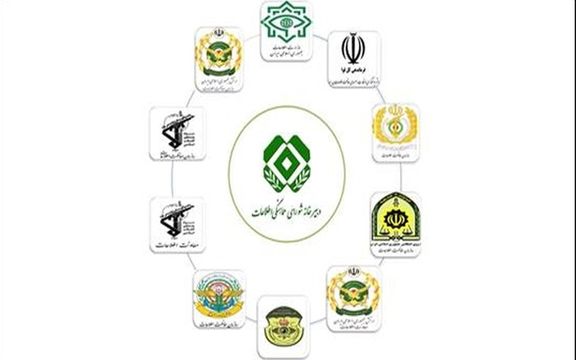
While there are already several parallel intelligence organizations active in Iran, a lawmaker says the Islamic Republic’s judiciary is about to set up a new one.
Abolfazl Amouei, the spokesman of the parliament's National Security and Foreign Policy Committee, said Monday plans are in place to discuss the establishment a new intelligence organization for the Judiciary branch. The aim of the new outfit will be "preventing and countering measures to threaten and bribe judicial authorities."
Gathering information and reports about sensitive cases “to counter the propaganda campaigns by the global arrogance” is also mentioned as part of the duties of the new organization, indicating that the body will also coordinate with other entities out the judiciary apparatus. “Global arrogance” is a term used by the Islamic Republic to refer to the United States.
Iran has a traditional Intelligence Ministry, but other state entities, such as the Revolutionary Guard have established their own spy and security agencies. Now it appears the hardliner Judiciary has joined the game, which is not an unprecedented in the Islamic Republic. The trend, which has been evolving for over four decades, reached a turning point in 2009 with the formation of the Intelligence Organization of the Islamic Revolutionary Guard Corps, an intelligence agency within the IRGC and part of the Council for Intelligence Coordination.
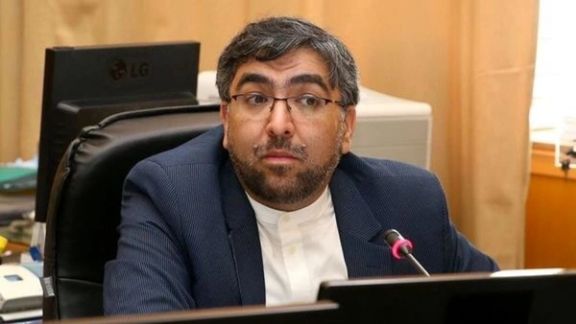
The Council is comprised of at least 13 to 16 separate active intelligence agencies, according to different sources. Most of these parallel agencies have strong ties with the IRGC and the judiciary as well as the office of the Supreme Leader. The intelligence minister, the interior minister, foreign minister and the country’s chief justice are members of the body. The IRGC’s Intelligence Organization, and its Intelligence Protection Organization, and their counterparts in the traditional Army and Police force as well as cyber police are some of the other members.
Such parallel structures among the intelligence agencies is a can of worms that regime’s officials rarely speak about. However, a few politicians, such as outspoken conservative Ali Motahari, who was deputy-speaker in the previous parliament, have talked about the issue and repeatedly criticized it. Motahari famously said that the intelligence minister should not allow other organizations to interfere in the work of the Ministry. Heydar Moslehi, the intelligence minister under President Mahmoud Ahmadinejad, also warned against the "parallel work and confusion in intelligence operations." Amid tensions between the ministry and the IRGC’s intelligence organization, he had also sued the Fars news agency, affiliated to the Revolutionary Guards, accusing it of "spreading false news."
The deputy head of Fars news agency has been recently arrested for “forging briefing reports” after a large set of documents was released by a hacktivist group late in November.
Earlier in the week, Chief Justice Gholam-Hossein Mohseni Ejei also criticized the forced confessions coerced through torture and threats from people who have been arrested during the current wave of protests. His remarks suggest that such confessions, which have been the basis for the regime’s justification of executions and prison sentences, have been extracted by intelligence agencies outside the judiciary, mainly by IRGC intelligence. His criticism came on the backdrop of remarks by the former chief of Iran's state television, who says there are operatives in intelligence organizations with unknown identities, with vast powers and no accountability.
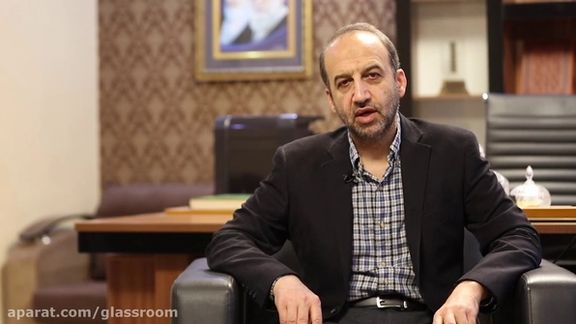
The former chief of Iran's state television says there are operatives in intelligence organizations who have vast powers, but their identities remain unknown.
Mohammad Sarafraz who resigned his post as head of IRIB (Islamic Republic of Iran Broadcasting) in May 2016 due to interventions in his organization's financial operations by Supreme Leader Ali Khamenei's son Mojtaba and former IRGC intelligence Chief Hossein Taeb, was one of the closest persons to Khamenei until then. The Supreme Leader later appointed Sarafraz as a member of the Supreme Council of Cyberspace. But Sarafraz says he resigned this post also, although Khamenei never accepted his resignation.
In an interview conducted by one of his former aides, Shahrzad Mirgholikhan, and published on You Tube, Sarafraz said that Iranian intelligence officers can even tell judges at the court what they should decide when ruling on various cases.
Sarafraz accused the government and banking system of systematic corruption that has led to vast income gaps among Iranians. He said most of this corruption exists in companies that enjoy the benefits of private firms but pretend to be government entities when they are paying taxes or report their financial status. These companies, he said, leave no room for competition by real private companies.
Eighty percent of Iran’s economy is directly or indirectly controlled by the government or semi-official companies. A privatization drive began 15 years ago, but it mainly turned into setting up quasi-governmental firms controlled by powerful insiders who block competition and use public funds to stay afloat.
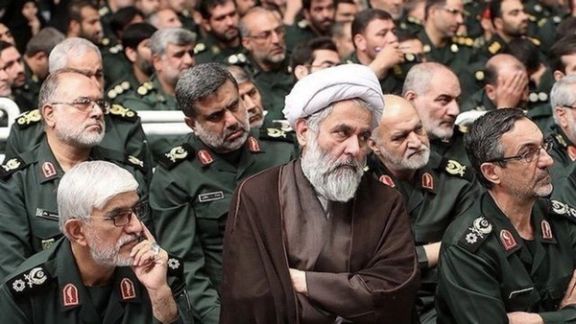
Sarafraz explained that these entities use insider information to benefit from foreign exchange and gold price fluctuations when the government intervenes in the market. They also make hefty profits by circumventing sanctions.
Sarafraz also criticized the government for destroying most political parties and depriving Iranians of the right to choose their own candidates for the parliament or presidency. He said, "I believe that in a healthy system the government should provide a budget for political parties that train cadres for the government."
Instead, Sarafraz pointed out, rich and powerful government institutions act like political parties. These institutions determine who should be the country's President or who should win in the parliamentary elections, thanks to their financial, political and intelligence powers. Sarafraz was probably referring to the Revolutionary Guard (IRGC) and Khamenei's office and family who have been accused by politicians, such as reformist cleric Mehdi Karrubi, of engineering all presidential elections since 2005.
This has created “systematic corruption which is likely to land the country in deep trouble,” Sarafraz insisted and said, that most of what the intelligence agencies and the IRGC do in Iran are illegal, but they can get away with it as no one is in control. Meanwhile, none of these organizations assume responsibility for the instability their actions create.
Sarafraz pointed out that "Government forces killed between 300 to 1,500 people in the 2019 protest. But no one accepted responsibility for even one of those cases.”
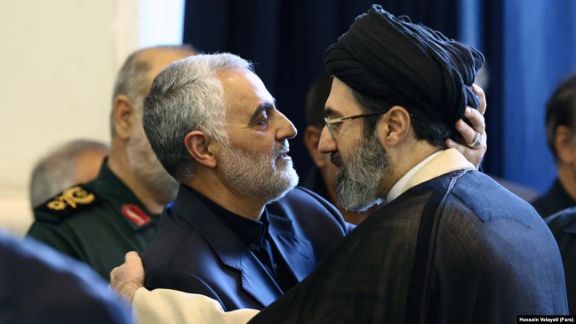
"These individuals and institutions also control the state television and order it how to report events, how to get forced confessions from political prisoners and how to broadcast them. That is one of the reasons why society has no trust in the state-owned television. Not only they do not tell the truth, but they also fabricate fake news to present a different narrative," the former head of IRIB said.
"The same guys and their agents wanted to take over the TV by controlling its financial resources," said Sarafraz while claiming that there are Mossad and CIA agents among them. He explained: "I told IRGC Commander Hossein Salami that those individuals and institutions [IRGC Intelligence and Khamenei's office] first tried to control the state TV and then targeted the IRGC. I told him that they were discrediting the IRGC."
"If the CIA has planned this, we need to praise them," he said.
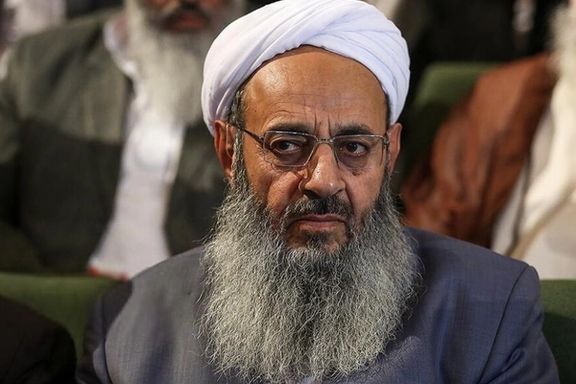
Leading Iranian Sunni cleric Mowlavi Abdolhamid has once again warned about the consequences of executions and suppression of protesters in Iran.
In a tweet on Monday, Abdolhamid, the religious leader of Iran’s largely Sunni Baluch population, asked the authorities of the Islamic Republic to listen to the voice of the protesters.
His comments came after the Iranian regime hanged a second protester, Majidreza Rahnavard in less than a week in public on Monday after charging him with killing two members of security forces.
“Arbitrary executions and repression have no result other than God’s displeasure, public hatred, and igniting the nation’s anger,” reads his tweet.
He further asked the government to “see the facts and hear the voice of the people.”
During his trial, Majidreza Rahnavard was denied the right to choose a lawyer, and his execution was carried out only 23 days after his arrest, which has raised many questions about the trial process and judicial justice.
Abdolhamid had previously said in reaction to the execution of Mohsen Shekari, who was the first protester hanged by the regime December 8, “it is not correct from the viewpoint of the Quran and Sharia to execute a person who did not kill anyone and only blocked the road and used a knife.”
Mohsen Shekari, the 23-year-old protester was only accused by the judiciary of blocking a street and injuring a Basij militia.

In a rare moment of truth, Tehran Friday prayer leader Mohammad Hassan Abutorabi has said that the government has been losing its standing in the society.
Abutorabi's statement may possibly signal some kind of diversity in the rhetoric of Friday Prayer Imams, who in calmer times repeat a centrally crafted message to believers attending sermons on Fridays.
He advised government officials to behave based on ethical standards, as systematic financial corruption has become a characteristic of the Iranian government and its officials in recent years.
Abutorabi added that the officials' commitment to ethical standards is the only way to restore the government's lost social capital. Abutorabi's comments are in sharp contrast to remarks by other Friday Prayer leaders who have called on officials to tighten control over the society.
To highlight the difference in messaging recently, the Friday Imam in Mashad, Ahmad Alamolhoda has accused Iranian women who protest against compulsory hijab of being linked to foreign networks and the outlawed Mojahedin-e Khalq (MeK) opposition group. The hardliner Ahmad Khatami in Tehran on the same day thanked the Iranian judiciary for its quick verdict in issuing the death sentence for the 23-year-old protester Mohsen Shekari who was executed in Tehran December 8.
Meanwhile, Abutorabi criticized the government for wasting the country's gas and oil resources and paving the way for smuggling fuel out of Iran.
In another development, Hossein Marashi, the leader of the centrist pro-reform Executives of Construction Party has told a local website that "We should not sacrifice the country for the sake of one individual," adding that "We should attach priority to the people."
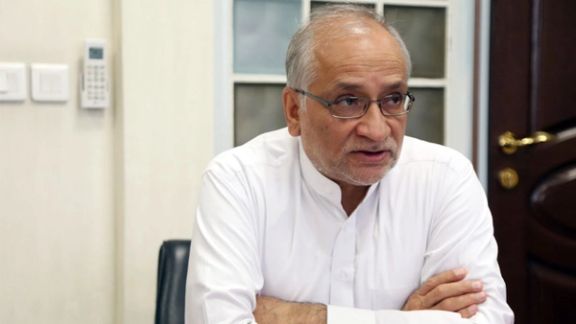
Most readers would have immediately assumed that he was speaking about the 83-year-old authoritarian ruler Ali Khamenei, but Marashi, probably realizing he might have gone too far, later underlined that he was referring to President Ebrahim Raisi, who is really not a major player amid the current crisis.
Speaking about the ongoing uprising in Iran, Marashi said: "This movement is fueled by the Islamic Republic's mistakes," adding that "We should not sacrifice the Islamic Republic for Raisi." He further explained that his party believes that "Current protests are the outcome of problems resulting from government officials' performance. Their performance has pushed the country to the point of explosion."
Marashi went on to say: "During the past five years, the county's usual 20% inflation rate increased to over 45% and at times to 60%. As far as foodstuffs are concerned, the inflation rate even reached 90%. The people are facing high inflation and high unemployment rates, and yet the government has not been doing anything about it."
He added: "Goods including medicine have become scarce and the people are angry and what the government did was ban social media and tighten compulsory hijab rules, which further angered the people. In foreign policy the government has been always creating tensions with the United States, Israel and Saudi Arabia."
He suggested that Iran should settle its disputes with Saudi Arabia and replace Ali Bagheri with Abbas Araqchi to conclude the differences over the nuclear deal with the United States as quickly as possible. "For how long we should wait for Raisi to solve the problems?" He asked.
Marashi also criticized the use of violence against protesters, which has resulted in about 500 deaths among civilians.
Marashi argued that 75 percent of Iranians are unhappy with the government's performance but only 5 percent take to the street. The government still has a chance to end the crisis, as long as this difference exists.

People took to the street in Iranian cities Monday evening chanting slogans or quietly marching in protest to the execution of a second protester in the morning.
A video taken in Mashhad, the hometown of the twenty-three-year-old Majidreza Rahnavard who was executed in the early hours of Monday, shows a group of youth chanting “Why you are silent people? Iran has become Palestine!”.
Photos published of the “public execution” show the young man hanging from a construction crane in the dusk while masked security forces and tens of others stand around. The body was left hanging until after sunrise.
Spectators of the “public execution” were apparently handpicked members of the security forces and judiciary officials as the public and even the family had been kept in the dark about the decision to execute him.
Authorities allowed Rahnavard’s mother a visit to prison Sunday evening without telling the family their loved one was going to be executed the next morning. The two even took several photos together in which both, apparently falsely believing that the death sentence had been dropped, appear with smiles on their faces.
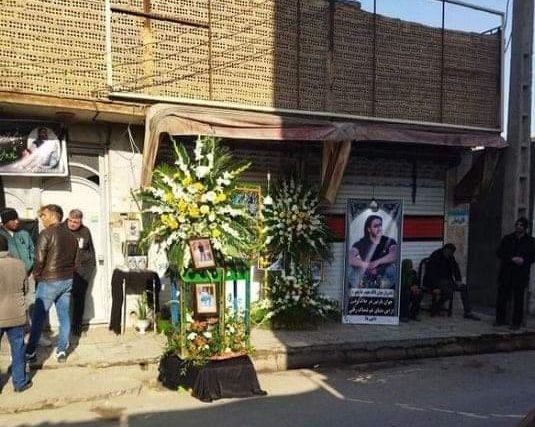
Photos posted on social media show the bereaved family have decorated their door with colorful lights and put a large photo of him. They also erected a domed structure known as hijla (bridal chamber) in front of their house, also decorated with lights and flowers as tradition dictates when a young man dies before having wed.
There are also photos and videos of Rahnavard’s grave, where security forces buried him before informing the family of the execution. “Martyred for the homeland”, one of women present at the grave chants. In another video people are heard wailing and chanting “Khamenei is a murderer, his [religious] authority is not legitimate!”.
Iran's judiciary claims that Rahnavard attacked several “protectors of security”, apparently two Basij members and plainclothesmen, without provocation and stabbed two of them to death. Some people, however, have claimed on social media that the young man took part in several protests and had used the knife to defend his younger sister who was harassed for her ‘bad’ hijab by several of the Basij militiamen and plainclothesmen on the street near his home on the day of the incident.
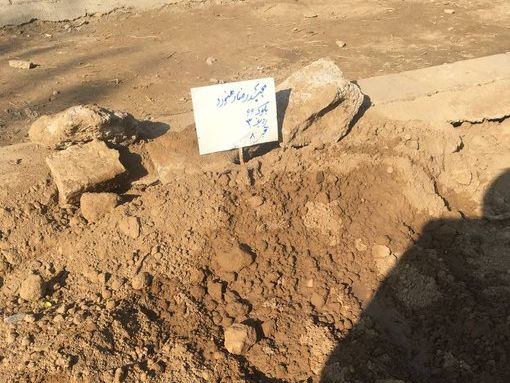
There are few videos of protests Monday evening, apparently for the reason that people are leaving their mobile phones home for security, but a video posted on Twitter shows protesters chanting against the Revolutionary Guards (IRGC) and its Basij paramilitary force in Shiraz, capital of Fars Province. Another video shows people silently marching in Karaj, capital of Alborz Province to the west of Tehran.
In several neighborhoods of the capital, including Haft Howz in the east of the capital and Sattar Khan, and in Rasht, capital of the northern province of Gilan, people protested on the streets, chanting slogans such as “Down with the Dictator”, “Last message! We will rise up if you execute!”, and “You took away Majidreza and brought back his lifeless body!”
A video posted on Twitter shows that in Sattar Khan avenue protesters who had gathered outside the house of Mohsen Shekari, who was the first to be executed four days ago, clashed with security forces, chanting “Rascals, Rascals” at them.
Some people chose to express their anger in yet other ways. A woman in Tehran protested by holding placards telling the government “Don’t execute” at a metro station. Another woman at a metro station held a placard which urged people to “wake up” and protest to executions to put an end to “gallows”.
Protesters said on Twitter that security forces were using tear gas to disperse people as soon as more than a handful gathered, even quietly. Others reported that internet is very slow or completely down, to prevent uploading videos.
“There was a good crowd where we were in Haft Howz [in the east of Tehran], walking and pretending to be shopping, but they started shooting at us with paint markers and pepper sprayed us. My father is a war veteran and was badly affected by it,” a protester tweeted.